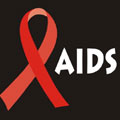
Now there is good news in the treatment of HIV affected people. Scientists have found that chemicals like Marijuana set off receptors on human immune cells that can directly inhibit a type of human immunodeficiency virus (HIV) found in late-stage AIDS.
This is the first such a study which has reveals that Marijuana receptors found on immune cells-called cannabinoid receptors CB1 and CB2-can influence the spread of the virus. By this research patients suffering from late stage AIDS can have a new hope.
It is noted that Medical marijuana is prescribed to treat pain, debilitating weight loss and appetite suppression, side effects that are common in advanced AIDS.
According to Cristina Costantino, PhD, Postdoctoral Fellow in the Department of Pharmacology and Systems Therapeutics at Mount Sinai School of Medicine, it is known that cannabinoid drugs like marijuana can have a therapeutic effect in AIDS patients, but did not understand how they influence the spread of the virus itself. HIV infects active immune cells that carry the viral receptor CD4, which makes these cells unable to fight off the infection. In order to spread, the virus requires that "resting" immune cells be activated.
During research process by treating the cells with a cannabinoid agonist that triggers CB2, Dr. Costantino and the Mount Sinai team found that CB2 blocked the signalling process, and suppressed infection in resting immune cells.
Triggering CB1 causes the drug high associated with marijuana, making it undesirable for physicians to prescribe.According to Dr. Costantino, developing a drug that triggers only CB2 as an adjunctive treatment to standard antiviral medication may help alleviate the symptoms of late-stage AIDS and prevent the virus from spreading.
Because HIV does not use CXCR4 to enhance immune cell infection in the early stages of infection, CB2 agonists appear to be an effective antiviral drug only in late-stage disease.
As a result of this discovery, the research team led by Benjamin Chen, MD, PhD, Associate Professor of Infectious Diseases, and Lakshmi Devi, PhD, Professor of Pharmacology and Systems Therapeutics at Mount Sinai School of Medicine, plans to develop a mouse model of late-stage AIDS in order to test the efficacy of a drug that triggers CB2 in vivo.
(With Input from ANI)
null
|
|
Read More: NATIONAL AIDS CONTROL ORGANISATION (NACO) | Lakshmi Narayan Mittal | Lakshmi Bazar | Mount St Joseph | St.thomas Mount H.o. | Mount Stuart | Calvari Mount | Lakshmi Coil | Mount | Nattassery S H Mount | Pious Mount | Sainik School | Suri Dist. School Boardndtso | Lakshmi Narayan Pur | District School Board | School Para | School Dhura | Lakshmi Pabartak | Lakshmi Janardanpur | K.r.high School


Comments: